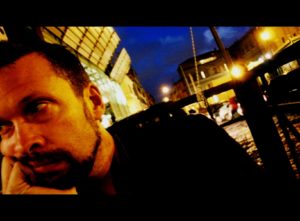The cultural editorial team of YOUng is honored and proud to publish this magnificent essay and thanks the author for having granted it to us.
D.C.
The Pilate-House: Writers, Readers, and the Loneliness of Authority – Leon Weinmann
Blessed are you who believe in me without having seen me. For it is written of me that those who see me won’t believe in me, and those who don’t see me will believe in me and live.
—text of a letter from Jesus to King Abgar, reported in Eusebius, Ecclesiastical History I.xii.10.
In Rome’s Piazza San Giovanni, in the remains of the old Lateran Palace, lies the Scala Santa, the set of marble steps which Jesus allegedly ascended for his interview with Pilate and which Helena, mother of Constantine, allegedly had shipped from Jerusalem to Rome. Every year, thousands of pilgrims climb the Scala Santa on their knees, saying a prayer with every step; nonbelievers who want to go upstairs on foot may use a flanking pair of scale profane.
At the top of the stairs stands the Sancta Sanctorum, or Holy of Holies, once the private chapel of the popes and today a darkened room, always closed, the interior of which is visible through a single grated window. A golden frieze proclaims the intended meaning of the room—NON EST IN TOTO SANCTIOR ORBE LOCUS—but gazing into the darkness, one feels only the presence of a counterfeit and flaccid mystery. For there is nothing in the room, or almost nothing—no human touch, and certainly no presence of the divine. For all but the most credulous Catholic, this chapel is one of the most dispiriting places in all of Rome.
One object, however, visible at the far end of the room, gives the Sancta Sanctorum its claim to holiness: a small, strange painting of Christ, standing alone on a modest altar. According to church teaching, this painting was begun by St. Luke and finished by an angel, and so belongs to that class of religious art known as acheiropoieta, or images not made by human hands. Other examples include the Image of Edessa, or Mandylion, the Veil of Veronica, or Sudarium, and the Shroud of Turin. Such works represent an attempt to elide the distinction between art and relic, yet these images cannot properly be classed with the phalanges and metatarsals of the martyrs: they remain human attempts at meaning-making, even as the Church, like Peter, keeps denying their identities.
The image in the Sancta Sanctorum supposedly portrays Christ the Teacher, bearing a scroll in his left hand and raising his right in benediction—supposedly, because no one may see the work. In the 12th century, Pope Alexander III covered the original image with another image, this one on silk, and several years later, Innocent III covered it again in a gilt revetment, thus creating a tautological artifact the only remaining meaning of which is the authority of the church itself. Like all acheiropoieta, this image may be revered, but never appraised (one would not, for example, remark that the nose on the Shroud of Turin seems rather badly done); denied its humanity, this image may be believed, but never seen.
*
Thus the Lateran image is not and could not be the subject of this or any essay. Because it has entered the Symbolic, it is as a symbol that I will treat it: as an instructive symbol, not of authority, but of the effects of authority on the act of interpretation. By “authority” I mean any institution, person, or theory (religious, political, critical, or authorial) whose teachings or methods insist on establishing meaning as a fact and not as an event, on fixing meaning outside of time and therefore outside the human. We have seen, in the case of this painting, that denying the work its human author necessarily renders the reader equally superfluous; the same is true whenever pretensions to authority intercept the meaning-making dialogue between author and audience.
Authority, unlike mere power, requires legitimacy and thus must enact itself through a dialectical process which relies on the consent of an other. What power takes by force, authority wants to be given. And yet authority must not have to ask for what it takes: its existence depends simultaneously on 1) the consent of the other and 2) on its refusal to acknowledge the consent of the other, since such an acknowledgment would reveal an equality which would undo authority’s claim to rule.
For precisely this reason, authority can be difficult to see. Parents, priests, police officers, professors—all wield an authority which remains valid only so long as such authority seems inevitable. By the time an institution, person, or theory has attained a measure of authority, its authority manifests itself only in a series of accepted and therefore unspoken premises which hide behind whatever conclusions they produce. We have a law, and according to the law, etc. Only in retrospect do we learn the truth: our parents were in over their heads, lost and sometimes downright nuts; our priests and policemen, sociopathic bullies; our professors, neurotic little women and men starving for security and respect. But only in retrospect; in the moment, their authority remains invisible as blindness.
This essay wants to learn how authority affects the way we use and understand language. Because the assumptions which govern our thinking in the present are often difficult to identify and thus discuss, I want to focus my attention on two curiosities from the relatively recent past whose pretensions to authority should today be easier to see: Roland Barthes’ “The Death of the Author,” and some of the early manifestos of the so-called “Language” poets. Although these essays, like the Church, come in the name of a radical salvation, I want to argue that their pursuit of authority leads not to salvation but to blindness, and that instead of democratizing meaning, these essays, like all forms of authority, lay a revetment between their audiences and the literature which ought to save them.
I begin with three premises.
Eros, Authority, and Speech
- Because there can be no language without consciousness, and no consciousness without desire, that is, a consciousness of what we lack, of what we are not, language is always and inescapably an expression of eros, always the fruit of loss, always an always unsuccessful attempt to call back what is gone. Etymological parlor games abound: mean, from IE *men, hence mens, mentula, the mind and penis. Intend, from in-tendere, to stretch out toward. Vouloir dire, literally, to want to say. In our first world of total immanence, a world inhabited by animals, infants, idiots, and God, there was no need for or possibility of language; only when that world collapsed into time and desire emerged along with consciousness did language become both possible and necessary. We are dreaming when we say “In the beginning was the Word”; our word (not Word) came second, always as response and always only human. Nor is it accurate to claim, as the Priestly Writer does in Genesis 1, that God spoke the world into being. What can God in His completeness know of loss?
If language is erotic, then toward what or whom does it intend? Toward an other, real or (more commonly) imagined, a dreamed reader who might take the work and temporarily fulfill its meaning. Temporarily, because there is no lasting fulfillment in language. I write toward you, my imagined you. I write a sentence; my desire to be understood subsides. I realize then that what I wrote is not what I meant, at all; my desire and my loneliness increase; I write again. You read a sentence; you understand, or think you do, and feel understood, or think you are; yet the next sentence undoes your understanding; you read it again or leave it for something else. If we may ever know a literary work, it is only in the Biblical sense: a flush of satisfaction and connectedness; a gathering foreboding of loss; a consequent intellectual retumescence; and either another go-round with the work or the work’s abandonment for another. To read well, to write well, in short, is to make meaning as one makes love.
All this is figurative, of course, but no one may come to the work except through parables. When, for example, Wimsatt and Beardsley write of the intentional “fallacy,” they employ a reductive metaphor from the field of logic, implying that a response to a work may be parsed as a simple premise or conclusion, as a statement merely true or merely false. When William Carlos Williams, high priest of the low demotic, declares that a poem is “a machine made out of words,” he reduces it to a reproducible assembly-line object, the inscrutabilities of which anyone with a flathead may easily unscrew. When Roland Barthes compares the work to a stocking, he imagines it as a thing, inhuman and safe. Even his favorite word “text,” a word we are all supposed to use now whether we speak of the Commedia or of instructions for prophylactics, is a metaphor designed to make us think of textiles, mere rags, and to direct us away from the mind behind the work. In my defense I can only say that this particular metaphor of lovemaking seems more right to me than others, less reductive, more hopeful and more life-affirming, that I prefer sex to syllogisms, or screwdrivers, or stockings, and that I much prefer to imagine the legs beneath those stockings—legs the existence of which Barthes explicitly denies—than to fuss too much over the silk that covers them up.
- Language is inimical to authority. By this I do not mean that language is revolutionary in any political sense; authority, after all, is precisely what revolutionaries want. Nor am I trotting out the old deconstructionist argument that the purported meaning of a work always undermines itself. (Of course it does. Then what?) I mean merely to make two observations which should be so self-evident that they are really no observations at all.
First, because language exists before and after us, there is no pure creation in language, no wholly original speech, no truly efficacious or authoritative utterance. We dream of being Adams, naming our private bestiaries, but because our words precede (or as Milton would say, prevent) us, we speak forever as one who has arrived too late. I take these words, which smell of other people, and put my mouth and hands on them. I make them mine, or dream I make them mine, but only briefly, since I must give them then to others, who put them in their own mouths, who run their hands along their spines, who do, perhaps, unspeakable things to them. But language is all we have, and meaning-making is always and only a shared enterprise. For this reason there can be no pure hermeneutics of faith, since placing authority solely in the hands of what Barthes calls the Author-God renders meaning impossible; nor can there be any pure hermeneutics of suspicion, since placing authority solely in the hands of the critic likewise interrupts and perverts the flow of meaning from one mind to another. Like fascism and communism, faith and suspicion form two halves of a circle which meet at the same uninhabitable poles. What is needed is a more temperate hermeneutics of patience, a hermeneutics that manages simultaneously to doubt and trust.
Second, to use language is to betray one’s finitude, to admit that one does not have all one wants, to reveal that one needs another. This is as true of simple assertions such as “Pass the salt” or “Why don’t we go back to my place?” as it is of political rhetoric. Tyrants, who must take care to appear to be complete unto themselves, attempt to kill the eros which inheres in language in three ways. First, they may prefer spectacle to speech, erecting colossal statues of themselves, slapping their idealized portraits up in every orphanage and madhouse, or presiding, as embalmed and uniformed deities, over endless phallophoric processions of their nation’s nuclear missiles. Second, they may wrap themselves in the personality cult they have so carefully created, in order that they may speak not as human beings but as incarnations of an infallible idea. (L’etat, c’est moi.) Finally, they may speak in a guarded and exhaustively vetted langue de bois, and then only to an idealized and therefore nonexistent “people.” In all cases, however, dialogue must never be allowed to live: every challenge to authority must be answered with a “What I have written, I have written,” with a “We have a law, and according to the law….” Authority, in order to maintain itself, must admit neither to desire nor to the fear of admitting desire, yet language, by its nature and existence, reveals such desire continually as the very ground of its being.
Think, for example, of Nicolae Ceauşescu’s final days, which began with his famous last address to his Romanian subjects on December 21, 1989. Standing on a balcony overlooking what would soon be renamed Revolution Square, Ceauşescu begins his speech with the usual Communist platitudes. It is clear from the surviving footage that, like all tyrants, he has grown used to worshipful validation of his every word. (As one of the prosecutors in his show trial would accuse him just four days later, “You have never been able to hold a dialogue with the people. You were not used to talking to the people. You held monologues and the people had to applaud….”)
Several minutes into his speech, however, a swell of hisses, boos, and chants suddenly crests and surges toward him through the protective cordon of hardcore party loyalists. Ceauşescu, his face fixed in a mask of childish doubt, dawdles a moment at the podium before raising his hand, in vain, to call for silence. His wife Elena, mother of the nation, commands the crowd to stop. The hissing grows into a keen of static. In frustration, he begins repeating the same helpless word into the microphone: Hallo. Hallo. Hallo. No one answers. The crowd, which for years has let him believe he was the only creature endowed with speech, has forced him to admit his need, has forced him, if only briefly, into vulnerable, shared humanity. He has become a man.
Four days later, of course, he would stop being a man, forced out of his vulnerable humanity by another authority equally unconcerned with dialogue. The transcript of the Christmas Day tribunal at Tirgoviste, in which both the prosecutors and the Ceauşescus simultaneously assert their own authority while denying the authority of the other, reads like a parody of Christ among his captors:
PROSECUTOR: Nicolae Ceauşescu should tell us why he does not answer our questions. What prevents him from doing so?
CEAUŞESCU: I will answer any question, but only at the Grand National Assembly, before the representatives of the working class. Tell the people that I will answer all their questions. All the world should know what is going on here. I only recognize the working class and the Grand National Assembly — no one else.
PROSECUTOR: The Grand National Assembly has been dissolved.
CEAUŞESCU: This is not possible at all. No one can dissolve the National Assembly.
PROSECUTOR: We now have another leading organ. The National Salvation Front is now our supreme body.
CEAUŞESCU: No one recognizes that.
Then, later:
CEAUŞESCU: I do not recognize you. I am talking to you as simple citizens at the least, as simple citizens, and I tell you: I am the president of Romania.
PROSECUTOR: What are you really?
CEAUŞESCU: I repeat: I am the president of Romania and the commander in chief of the Romanian army. I am the president of the people. I will not speak with you….
As in the Sancta Sanctorum, there is nothing to see here: everything has been decided. The Ceauşescus may only dimly suspect that they are about to be deconstructed out behind the building, but the prosecutors, with armed guards standing behind them, know full well that there is no room at the inn for these two, no reason even to speak. They are going to turn this couple into a pair of things, buried symbols, and no words will undo that decision. The prosecutor does not ask, “Who are you?”, after all, but “What?” Notice, also, that Ceauşescu, like Jesus, alternates between sullen silence (as in the synoptic gospels) and grandiose assertions of authority (as in John). Because authority attempts to fix meaning outside of time, it necessarily renders dialogue, which can move only in and as a product of time, impossible. Authority, though it may be spoken to, may not be spoken with; likewise, though it uses words, authority itself cannot speak. It may insist on meaning—with force or the threat of force—but cannot create meaning by itself.
- Readers and writers crave authority. We do not like to be naked before our enemies; we do not like to have our clarity clouded and our conclusions undone by others. This much should be obvious. We crave authority partly because it is frightening to admit that there is no such thing as knowledge, so we dream of lapidary prose, pretending our pronouncements are a stone in the river and not a paper boat the current bears away. More practically, however, we crave authority because we need our thirty pieces. The author needs to eat, and so needs to sell more books, and so needs to maintain her reputation as “the greatest so-and-so writing in language X today.” The critic (who remains, despite his efforts at self-fashioning, every bit as human as the author) needs to eat as well, so must hunt tenure, tracing his author through various well-beaten fields (Marxism, Deconstruction, and so forth, the hunting-grounds of his old teachers) and on into the thickets of Affect Studies, or Fat Studies, or whatever, hoping to find himself at last on some high ridge from which he may discern his fellow hunters starving in the valleys. Desiring safety, we chase authority, that dreamed-of position where none may answer us back, where what we write attains the air, if not the force, of law.
Silk Screens
Having set forth these three principles—language is erotic, language is the enemy of authority, and writers and readers crave authority—I would like to turn my attention now to Roland Barthes’ seminal 1967 essay “The Death of the Author.” My purpose here will be to show that his essay is not at all concerned with interpretation, but rather with defending a claim to the authority to interpret, and further, that what he calls his “anti-theological” criticism does not succeed in “opening” the literary work but rather seals and conceals it entirely—that Barthes, in killing the author, has made an acheiropoieton of the work, a shuttered, static object outside the diachrony in which meaning moves, an object which may be gilded by a critical orthodoxy but never seen or understood itself.
In 1967, Barthes’ essay meant something quite different from what it means today: as in politics, what began as a revolutionary premise has turned into a largely unquestioned and finally largely quaint point of orthodoxy. Yet Barthes’ intentions—if I may speak of intentions—were laudable: to liberate the work of criticism from foundationalist, essentializing readings of literature, to create a space for the critic to do more than produce encomia on Men of Genius, and to broaden the scope of critical inquiry beyond the borders of France’s cramped literary canon. In unseating the author, however, Barthes commits the grievous error of establishing the critic (whom he misleadingly calls “the reader”) in his place. Barthes is right to claim that we err in seeing the author as the fons et origo of a work’s meaning, but wrong to claim that the critic represents the telos of that meaning. His error springs, I think, from the structuralist and post-structuralist habit of thinking in terms of binary oppositions, a habit which since Pythagoras has been the chief impediment to Western thought. While structuralism, which attempts to impose a system of binary oppositions on the literary work, may adequately describe synchrony, it remains unable to account for changes in meaning which result from diachrony—that is, the way in which language and its meanings move in time. Barthes, in seeing the work not as an event but as an agonistic, eternal space in which either the author or the reader must die, kills both of them.
I want to examine one particular passage from “The Death of the Author,” which I will quote here in full:
Once the Author is removed, the claim to decipher a text becomes quite
futile. To give a text an Author is to impose a limit on that text, to furnish
it with a final signified, to close the writing. Such a conception suits
criticism very well, the latter then allotting itself the important task of
discovering the Author (or its hypostases: society, history, psyche,
liberty) beneath the work: when the Author has been found, the text
is ‘explained’–victory to the critic. Hence there is no surprise in the fact
that, historically, the reign of the Author has also been that of the Critic,
nor again in the fact that criticism (be it new) is today undermined along
with the Author. In the multiplicity of writing, everything is to be
disentangled, nothing deciphered; the structure can be followed, ‘run’
(like the thread of a stocking) at every point and at every level, but
there is nothing beneath: the space of writing is to be ranged over,
not pierced; writing ceaselessly posits meaning ceaselessly to evaporate
it, carrying out a systematic exemption of meaning. In precisely this way
literature (it would be better from now on to say writing), by refusing to
assign a ‘secret’, an ultimate meaning, to the text (and to the world as
text), liberates what may be called an anti-theological activity, an activity
that is truly revolutionary since to refuse to fix meaning is, in the end, to
refuse God and his hypostases—reason, science, law.
Let us examine closely several of these phrases.
To give a text an Author is to impose a limit on that text, to furnish it with a final signified. In what sense may we “give a text an Author”? We may no more give a text an author than we may give a grieving woman her sorrow, or a chicken its stupidity, or a drunkard the wine already in his belly; the author (not Author) is a property of the work, perhaps a very small property, yet indivisible from its wholeness. That the author’s intentions, values, worldview, and so forth, do not hold the one and only key of meaning (as if such a key existed) should be obvious to anyone who isn’t a tyrant or a fool. Perhaps the French academies were filthy with such petty minds, in which case Barthes’ objections must have seemed necessary. But no one who truly loves a work of literature cares to “impose a limit” on it, and no one who uses language, who listens to it come and go in time, believes in “a final signified.” Moreover, those who do care to impose limits on texts do not need an author to assist them with their enterprise, as the worst of literary criticism has shown. So, yes—Away with final signifieds! But when Barthes claims, elsewhere in his essay, that “a text is made of multiple writings, drawn from many cultures and entering into mutual relations of dialogue, parody, contestation, but there is one place where this multiplicity is focused and that place is the reader,” he has done no more than open the front door while slamming the back door shut. Readers, as every writer knows, are not all they’re cracked up to be.
Such a conception suits criticism very well, the latter then allotting itself the important task of discovering the Author (or its hypostases: society, history, psyche, liberty) beneath the work. True. Yet we should note that any conception suits criticism very well, since the task of the critic, too often, is to arm himself with a conception and use it on the work and against other critics. The death of the author has not prevented critics from “discovering” a final signified in the literary work; indeed, the author’s “hypostases” have managed to thrive without him—or as Barthes writes, without it.
In the multiplicity of writing, everything is to be disentangled, nothing deciphered; the structure can be followed, ‘run’ (like the thread of a stocking) at every point and at every level, but there is nothing beneath. If by “deciphered” Barthes means frozen in time, then yes—meaning does not stop. It would be better to ask of a work, after all, not “What does it mean?” but “What is it meaning?” But Barthes’ structuralist training prevents him from imagining the work as an event and not an object. Language, when it is taken out of the lexicon and put into use, is no more a structure than a snowstorm or an orgasm. Nor is language a stocking, a mere object of analysis. True, a literary work is like a stocking in that its themes, motifs, and preoccupations may be imagined as strands of a whole, but such a conception, like all conceptions, imposes a final limit on the work. The moment we say “there is nothing beneath” we have not escaped but rather have committed ourselves to a final signified. There is everything—literally everything—beneath.
Writing ceaselessly posits meaning ceaselessly to evaporate it, carrying out a systematic exemption of meaning. Again I feel oppressed here by the tyranny of Barthes’ metaphors. Why can we not say instead that meaning does not “evaporate” but is instead borne forward, impelled, carrying out an organic, decidedly non-systematic revision or rebirth of meaning? Barthes seems to be discovering here that language is not, in fact, a closed structure, but because he is still committed to reductive structuralist ways of imagining language, he can only conclude that writing cannot mean. This is true only if one conceives of meaning as a fact and not a happening. Writing, because it is inescapably diachronic, means all the time, and then it means something else, and that is also a part of its meaning.
[Writing],by refusing to assign a ‘secret’, an ultimate meaning, to the text (and to the world as text), liberates what may be called an anti-theological activity, an activity that is truly revolutionary since to refuse to fix meaning is, in the end, to refuse God and his hypostases—reason, science, law. Certainly this is true, since to “fix meaning” is to kill it. Yet criticism—the true subject of Barthes’ polemic—refuses other meanings in an attempt to impose a meaning of its own. By killing the author, Barthes has done no more here than to reduce, limit, and dehumanize the work—in short, he has made the work an object on which theory may be overlaid. He has, like the Church, made an acheiropoieton of the very writing he praises for its capacity to liberate. In viewing the work as a patient etherised upon a table, a mere stocking, a mere tissue of quotations, he has attempted—again like the Church—to kill the eros which animates discourse. In revolting against the dominant critical modes of his own day (a necessary and inevitable task), he has asserted an equally reductive and dehumanizing authority of his own.
Language Poetry and the Rejection of the Polis
And yet I mean to discuss Barthes as a mere symptom and not a cause of the hermeneutic catastrophe that began in the late sixties and which persists today in a variety of weakened strains in both the academy and the world of letters. For there can be no doubt that, beginning in 1968 or so, something began to go grievously wrong in the marriage of art and ideas, poetry and politics. An irreversible loss of faith in the idea of civil society, combined with a philosophical wrong turn on the part of an often cynical and opportunistic intelligentsia, separated language from the world of material, and thus weakened—almost destroyed—art’s ability to comment on the world in any meaningful way or to effect any real political change. The Left has never recovered from this self-inflicted wound, nor will it until it can understand how and why this catastrophe occurred.
At the center of this catastrophe stands the problem of reference, the link between the Saussurean signifier and signified. And nowhere in the literary world during this time is the problem of reference treated with more urgency—or suspicion, or hatred—than in the early prose writings of the Language poets.
“Language poetry” remains a signifier with nebulous referents. Those who dislike Language poetry are apt to use the term as a synonym for “nonsense” (which is true, if imprecise—there are multiple species of nonsense, some more worthwhile than others), while proponents of the genre are unlikely to agree on its essential characteristics aside from the fact that it is “language-centered”—another imprecise phrase which could be applied just as easily to any number of different literary movements, from French Symbolism to Dada. Attempts to position Language poetry along a spectrum of “traditional” vs. “experimental” poetics likewise fail, since all experimental poetics become at length traditional, and forgotten traditions return inevitably as experiments. At present, I am concerned solely with what some of the genre’s earliest practitioners had to say about reference, in the hope of connecting their ideas about referentiality to the problem of authority.
And authority was exactly the problem the language poets were trying to solve: the authority of capitalism, the authority of essentialism, the authority, perhaps, of other more traditional poets who were publishing more profitably and getting better jobs. Looking through the archives of magazines such as this and L=A=N=G=U=A=G=E, one encounters multiple references to Marxist literary theory as well as frequent assertions of the political importance of Language poetry, and the one word which recurs obsessively in each issue is commodity. The word, these writers argue, has been commodified, profaned in the capitalist marketplace, and must be removed from the economy of desire, the economy which constantly promises, constantly defers. Such commodification occurs, of course, as the result of reference, a technique of capitalist control that writers must learn to resist. As a political act, poets must learn to refuse meaning, to “carry out,” as Barthes says in a separate context, “a systematic exemption of meaning.”
This is horseshit, yet we still might ask: how can non-referential poetry be considered a political act? How, as a random example, do these lines from “The sun is so…” by Ray DiPalma, Bruce Andrews, and Ron Silliman, function as a protest against capitalism?:
Or like the hypersensitive cream carton
Your house is as such in
Occasionally has business with sleeps
A needle shower frets…
The essay which addresses this question most directly is Steve McCaffery’s “The Death of the Subject: The Implications of Counter-Communication in Recent Language-Centered Writing,” which appeared in Supplement #1 of L=A=N=G=U=A=G=E in June 1980. Announcing that “literature has entered a crisis of the sign,” McCaffery promotes language-centered writing as a solution to this crisis:
Language-centered writing involves a major alteration in textual roles: of the socially defined functions of writer and reader as the productive and consumptive poles respectively of a commodital axis. The main thrust of this work is hence political, rather than aesthetic, towards a frontal assault on the steady categories of authorship and readership. What it offers is the alternative sense of reader and writer as equal and simultaneous participants within a language product. At its core, linguistic reference is a displacement of human relationships and as such is fetishistic in the Marxian sense. Reference, like commodity, has no connection with the physical property and material relations of the word as a grapheme.
It is always thrilling to stand in the presence of nerve. Hear how hopeful, almost joyous, this prose sounds, listening to itself dream of a politically vibrant poetry, calling for a return to the ideals of community, insisting on a radical equality that might reorder, even obliterate, the power structures that shape reading and writing. These goals are worthy and laudable. And yet this manifesto is exactly wrong in everything it says.
Instead of creating a politically vibrant poetry, the Language movement helped, in its tiny way, to remove poetry almost entirely from public life.
Instead of creating a community of equals, the poets of the Language movement concealed themselves behind reams of unreadable “graphemes,” thus rendering any true intimacy with their readers impossible.
Instead of creating a space for radical equality, the Language movement, in a stunning paradox, advanced precisely the same inhumane and fascist ideals that created the global financial crisis and made possible the spread of unrestrained capitalism. Because to slip words from their meanings, to escape the ethics of reference, is after all exactly the goal of every financier and propagandist. Once you cut the cord that ties the signifier to its signified (or money to its gold standard, or a digital bank record to the actual wealth of which it is a mere symbol), you may do what you like with it, the real world be damned. And yet, then as now, it is not language (or money, or anything merely symbolic) that needs saving, but real men and women.
McCaffery writes that Language poetry aims to subvert “the socially defined functions of writer and reader as the productive and consumptive poles respectively of a commodital axis.” By empowering the reader and removing the writer, Language poetry aims to make readers and writers “equal and simultaneous participants” in the production of meaning. It accomplishes this by refusing meaning, since without a Truth toward which to point, the author loses all authority over his reader. The reader, in turn, is liberated from his role as passive consumer and may begin to create meaning through the practice of his reading.
There is one problem: no one reads Language poetry.
I don’t mean merely that the audience for such work is extraordinarily small; few people today read poetry of any kind. Rather, I mean that it is impossible, literally impossible, to read such work, if by reading we mean two minds encountering each other in community. If I, the reader, am wholly responsible for supplying the meaning of the work, thus liberating myself from the so-called commodital axis, then there is no point in me reading any one piece in particular—I might just as well read anything, even in languages I don’t know. The world is my text, and I its author. Thus poems which refuse reference, which refuse to mean, cannot be poems at all. They are liturgies, documents of faith, all indistinguishable from one another and all holding the same meaning: This is a Language poem. Other more interesting meanings may indeed creep into Language poems, but only insofar as those poems are not, in fact, non-referential—that is, not Language poems—but poems which instead operate with some degree of good faith, poems which reveal the sensibility and intelligence of another human being, poems which are about more than the mere expression of a ridiculous dogma.
Just as Barthes, in killing the author, made an acheiropoieton of the work, so have the Language poets created acheiropoieta of their own poems, the only remaining meaning of which is their own authority. You will climb the stairs on your knees only to find that there is nothing to see, and yet you will be told in tract after tract that this nothingness is essential to your salvation.
This feigned concern for the reader and her liberation is the chief hypocrisy at the heart of the Language movement. McCaffery writes that Language poetry aims at “a pure, lexemic presence” which will enact a “synchronic poetics…tenseless and free from both reference and alternity.” But it is impossible to imagine a “tenseless” reader, since the reader exists only as the result of a preexisting work and a preexisting writer. The reader is the product of a relationship that may enact itself only in dialogue, hence only in time. Yet just as the Church attempted to take the Lateran image out of time and make it an eternal symbol of its own authority, just as Barthes attempted in “The Death of the Author” to privilege synchrony over diachrony and thus make the literary work a mere example of a theoretical truth, so have the Language poets attempted to kill the eros which animates discourse by separating the writer from his reader. They accomplished this by pretending that the author was not important, even as they were busy writing accompanying essays about the political importance of what they, the authors, were doing. At the same time, they preached a theology of liberation for readers, when in fact they were rendering reading impossible.
Many of the early Language poets, in retrospect, seem to have been motivated by a distrust, or perhaps more precisely, a weariness of the reader. The reader, after all, is an other, and the other is a threat under the best of circumstances: she sits in as-yet unimagined rooms, on unimagined days, and she takes our intended meanings and completes them, for better or for worse. She sits in judgment of us. More than representing a mere threat to our authority, she renders our authority impossible: we cannot imagine her without admitting that we will not have the last word. (Of course, she won’t either: meaning does not stop.)
Thus the Language poets’ passive-aggressive attitude toward the reader and toward the other in general. In the premier issue of L=A=N=G=U=A=G=E (February 1978), for example, David Melnick writes smugly of his experience sharing one of his poems, called “thoeisu,” with someone whom we are told pointedly was “in a wheelchair,” a detail meant, I suspect, to emphasize this reader’s helplessness and perhaps even laughability. The reader was “confused” by the poem, yet Melnick writes that “there was a new delight in not needing to explain.” Indeed. What I have written, I have written. By refusing meaning, the Language poet renders the reader powerless to question his authority, and thus fulfills every writer’s dream.
Yet because there is no authority in speech, no meaning without dialogue, the author who falls too much in love with his “new delight in not needing to explain” must come to see communication itself as a threat to authority, as a betrayal of the party line. Among many of these Language poets, in fact, one may identify a strange hostility toward the reader—indeed, toward any intelligence not belonging to the poet himself. In the third issue of L=A=N=G=U=A=G=E, for example, James Sherry asks testily, “Can we get to the point where we do not need to be reassured by meaning which accompanies language? Can we use language not as a lens through which the world is pleasantly or wrathfully distorted for the purpose of lulling the reader into another world of lies and symbols?” Is this what language has become, then? Another world of lies and symbols? One senses a tired-eyed paranoia behind such words; a mere three years removed from Nixon and Vietnam, nonsense must have seemed like the last refuge of innocence. McCaffery, too, writes distrustfully of the “motoric thrust of the word which takes you out of language into a tenuous world of the other.” Or, as Robert Grenier so succinctly puts it in the first issue of this, “I HATE SPEECH.”
These poets—like the Church, like Barthes, like all of us, I think—were afraid of time and other people, and so sought a pure authority that could shelter them and their language. Yet it is impossible to use language and still maintain authority; it is impossible to speak without forsaking our Edens. McCaffery writes that “linguistic reference is a displacement of human relationships,” yet he has it exactly backwards. Linguistic reference—language that travels with a purpose toward an other—is our only means of establishing human relationships. Words force us to admit that we need each other, that we are incomplete in ourselves. The productive eros of language forces us into solidarity with each other and into a community of shared and growing meaning.
The problem with authority, in the end, is that it is lonely; it is cut off from the rest of us; it is, in the strictly etymological sense, idiotic—that is, set apart from the temporal vitality of the polis.
How will we fight this loneliness and reestablish the community we have destroyed? By being honest; by trying to think not only within but also alongside of our established philosophies; by admitting our own humanity and the humanity of those we read (and who read us); and by being generous lovers.
We need fewer Innocents and more Montaignes, less holy-of-holies and more Que sais-je?—more readers and writers, in short, like the young Luther, who, in the blessed sede vacante before he became “Luther,” came to Rome as a young priest and was, according to legend, halfway up the Scala Santa when he realized he was climbing not into the presence of his savior but into the Praetorium of Pilate—and so stood up, and shook the dust off his sandals, and walked out like a human being, for Christ’s sake, into the light and heat, and women and men, and hours and days of the passing world.

Leon Weinmann is an American essayist and poet, and the author of Afterwords (FutureCycle Press, 2014). He lives in Connecticut.











